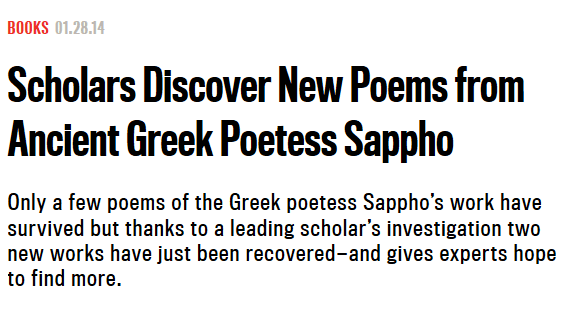The poetry world is all a twitter with the news that two new poems by Sappho have been discovered. And the Twitter world is spreading the news, chiefly linking to this write up in The Daily Beast:
Many tweeters simply reproduce the headline, with a link.  But some are evidently annoyed by the term poetess to refer to Sappho (see first two on right).
But some are evidently annoyed by the term poetess to refer to Sappho (see first two on right).
The recently revised (2006)  OED3 entry tells us that a poetess is merely “A female poet; a woman who composes poetry,” which is unchanged from the original definition in OED1. But the new entry adds that “The gender-neutral poet is now often preferred.” The most recent quotation illustrates why this might be:
OED3 entry tells us that a poetess is merely “A female poet; a woman who composes poetry,” which is unchanged from the original definition in OED1. But the new entry adds that “The gender-neutral poet is now often preferred.” The most recent quotation illustrates why this might be:
1993 M. Angelou Wouldn’t take Nothing for my Journey Now i. 6 She must resist considering herself a lesser version of her male counterpart. She is not a sculptress, poetess, authoress, Jewess, Negress, or even (now rare) in university parlance a rectoress.
Yet even as early as the mid 18th Century, women writers were wary of the term, as OED records:
1748 Lady Luxborough Let. 28 Apr. in Lett. to W. Shenstone (1775) 21, I am no Poetess; which reproachful name I would avoid, even if I were capable of acquiring it.
Perhaps, as Angelou suggests, all –ess feminine forms are now best avoided [even if actress, waitress, hostess, princess, sorceress, seamstress are still current to varying degrees and not generally considered offensive – what if we still had governesses and abbesses?].
Poetess may at some point have been especially contaminated by authoress, which even the 1884 OED1 entry remarked is only appropriate when the sex “is purposely emphasized” (to no good end, we expect – I have W. S. Gilbert’s nasty “a lady novelist — I’ve got her on the list” in mind), adding that “author is now used of both sexes”.
Like authoress, as we might expect, the first recorded use poetess of the term is not at all reproachful or nasty. It’s Tyndale referring to a Lady who has delivered “moch hie lerninge [=high learning] which as a goodly poetisse she vttered in rimes” (1531). And not long after, we see the word associated with our recently republished ancient:
1593 G. Harvey Pierces Supererogation 186 The heauenly deuises of the delitious Poetesse Sappho.
We are still, it appears, far from the condescending or belittling (othering, in contemporary parlance) –ess of later centuries. Yet even in the 19th C, we find a special connection between Sappho and poetess:
1873 J. A. Symonds Stud. Greek Poets v. 129 Among the ancients Sappho enjoyed a unique renown. She was called ‘the poetess’, as Homer was called ‘the poet’.
‘The Poetess’ is here an honorific, like ‘The Poet’, ‘The Philosopher’, ‘The Bard’, etc., the generic term given as a title to the greatest exponent of the genre. So perhaps not “the Ancient Greek Poetess Sappho.” Better, perhaps, “The ancient Greek poet Sappho, called ‘The Poetess’.”
Or, if that doesn’t do it for you, this:


No Comments